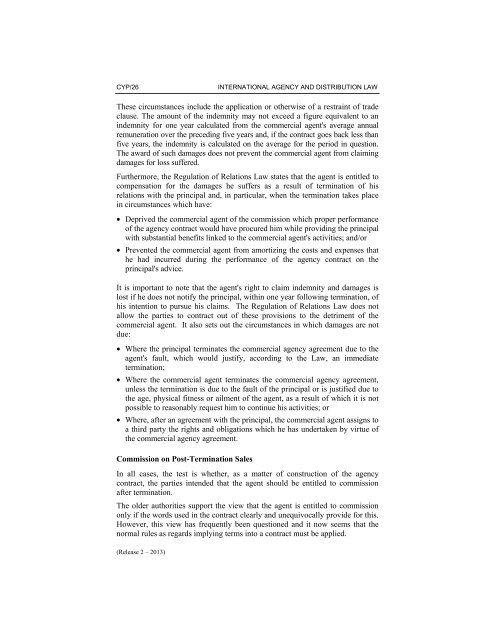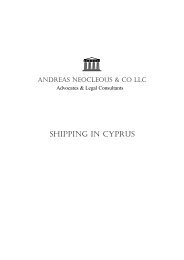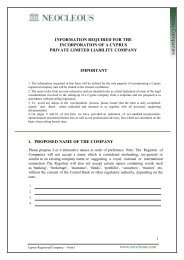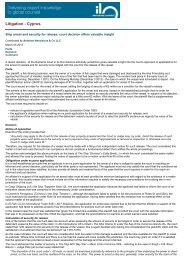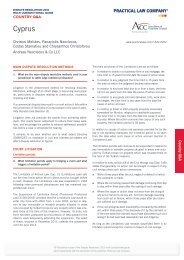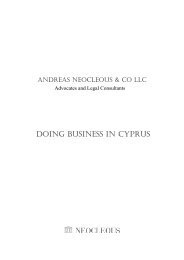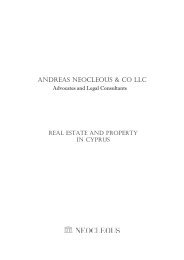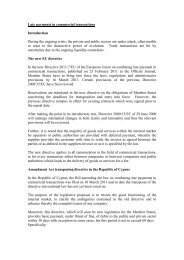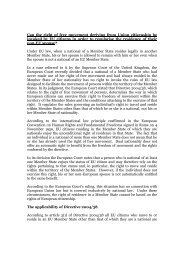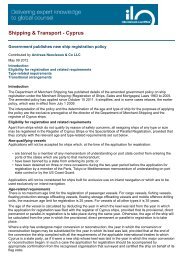Cyprus - Andreas Neocleous & Co
Cyprus - Andreas Neocleous & Co
Cyprus - Andreas Neocleous & Co
You also want an ePaper? Increase the reach of your titles
YUMPU automatically turns print PDFs into web optimized ePapers that Google loves.
CYP/26<br />
INTERNATIONAL AGENCY AND DISTRIBUTION LAW<br />
These circumstances include the application or otherwise of a restraint of trade<br />
clause. The amount of the indemnity may not exceed a figure equivalent to an<br />
indemnity for one year calculated from the commercial agent's average annual<br />
remuneration over the preceding five years and, if the contract goes back less than<br />
five years, the indemnity is calculated on the average for the period in question.<br />
The award of such damages does not prevent the commercial agent from claiming<br />
damages for loss suffered.<br />
Furthermore, the Regulation of Relations Law states that the agent is entitled to<br />
compensation for the damages he suffers as a result of termination of his<br />
relations with the principal and, in particular, when the termination takes place<br />
in circumstances which have:<br />
• Deprived the commercial agent of the commission which proper performance<br />
of the agency contract would have procured him while providing the principal<br />
with substantial benefits linked to the commercial agent's activities; and/or<br />
• Prevented the commercial agent from amortizing the costs and expenses that<br />
he had incurred during the performance of the agency contract on the<br />
principal's advice.<br />
It is important to note that the agent's right to claim indemnity and damages is<br />
lost if he does not notify the principal, within one year following termination, of<br />
his intention to pursue his claims. The Regulation of Relations Law does not<br />
allow the parties to contract out of these provisions to the detriment of the<br />
commercial agent. It also sets out the circumstances in which damages are not<br />
due:<br />
• Where the principal terminates the commercial agency agreement due to the<br />
agent's fault, which would justify, according to the Law, an immediate<br />
termination;<br />
• Where the commercial agent terminates the commercial agency agreement,<br />
unless the termination is due to the fault of the principal or is justified due to<br />
the age, physical fitness or ailment of the agent, as a result of which it is not<br />
possible to reasonably request him to continue his activities; or<br />
• Where, after an agreement with the principal, the commercial agent assigns to<br />
a third party the rights and obligations which he has undertaken by virtue of<br />
the commercial agency agreement.<br />
<strong>Co</strong>mmission on Post-Termination Sales<br />
In all cases, the test is whether, as a matter of construction of the agency<br />
contract, the parties intended that the agent should be entitled to commission<br />
after termination.<br />
The older authorities support the view that the agent is entitled to commission<br />
only if the words used in the contract clearly and unequivocally provide for this.<br />
However, this view has frequently been questioned and it now seems that the<br />
normal rules as regards implying terms into a contract must be applied.<br />
(Release 2 – 2013)


